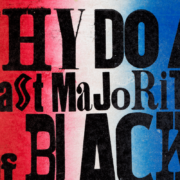An enduring unity at the ballot box is not confirmation that Black voters hold the same views on every contested issue, but rather that they hold the same view on the one most consequential issue: racial equality. The existence of the Black electoral monolith is evidence of a critical defect not in Black America, but in the American practice of democracy.
— THEODORE R. JOHNSON, THE NEW YORK TIMES MAGAZINE
In the autumn of 2008, just a few weeks after my 33rd birthday, I cast a ballot for the first time. Up to that point, serving in the military seemed like more than sufficient civic engagement and provided a ready excuse for voluntarily opting out of several elections. By the time Barack Obama won the Democratic primary, I was an officer who’d spent more than a decade in the Navy and not a second in a voting booth. This apathy does not run in the blood. My parents are products of the civil rights era and the Jim Crow South, and as such religiously exercised their hard-won right to vote. In my formative years, the basic disposition of the house politics pressed together progressive demands for racial equality with the Black conservatism of marathon church services that stretched deep into Southern Sunday afternoons. We differed in degree on any number of issues, but elections were where our politics really diverged. Like much of Black America, my mother is a lifelong Democrat, staying true even as the party vacillated in and out of her good graces. My father is a somewhat perfunctory Republican, an heirloom affiliation inherited from Black Americans’ early-20th-century preference for the party of Lincoln and consecrated in the familial name carried by my grandfather, father and me: Theodore Roosevelt Johnson.
But in November 2008, all three of us checked the box for Obama, our votes helping deliver North Carolina to a Democratic presidential nominee for only the second time in 40 years. My father had crossed party lines once before, in 1984, when Jesse Jackson ran for president. Jackson’s business-size Afro, jet black mustache and Carolina preacher’s staccato cadence transformed the typically all-white affair of presidential contests. “If a Black man had the opportunity to sit in the Oval Office,” my father told me years later, “I wasn’t going to sit on the sidelines.”
— Credits
Featured Image, Posters by Kennedy Prints
FULL ARTICLE @ THE NEW YORK TIMES MAGAZINE
— Related
Black Lives Matter (BLM) is a decentralized political and social movement advocating for non-violent civil disobedience in protest against incidents of police brutality and all racially motivated violence against black people. The broader movement and its related organizations typically advocate against police violence towards black people as well as for various other policy changes considered to be related to black liberation.
In July 2013, the movement began with the use of the hashtag #BlackLivesMatter on social media after the acquittal of George Zimmerman in the shooting death of African-American teen Trayvon Martin 17 months earlier in February 2012. The movement became nationally recognized for street demonstrations following the 2014 deaths of two African Americans, that of Michael Brown—resulting in protests and unrest in Ferguson, Missouri, a city near St. Louis—and Eric Garner in New York City. Since the Ferguson protests, participants in the movement have demonstrated against the deaths of numerous other African Americans by police actions or while in police custody. In the summer of 2015, Black Lives Matter activists became involved in the 2016 United States presidential election. The originators of the hashtag and call to action, Alicia Garza, Patrisse Cullors, and Opal Tometi, expanded their project into a national network of over 30 local chapters between 2014 and 2016. The overall Black Lives Matter movement is a decentralized network of activists with no formal hierarchy.
The movement returned to national headlines and gained further international attention during the global George Floyd protests in 2020 following the killing of George Floyd by Minneapolis police officer Derek Chauvin. An estimated 15 million to 26 million people, although not all are members or part of the organization, participated in the 2020 Black Lives Matter protests in the United States, making Black Lives Matter one of the largest movements in United States history. The movement has advocated to defund the police and invest directly into black communities and alternative emergency response models.
The popularity of Black Lives Matter has rapidly shifted over time. Whereas public opinion on Black Lives Matter was net negative in 2018, it grew increasingly popular through 2019 and 2020. A June 2020 Pew Research Center poll found that the majority of Americans, across all racial and ethnic groups, have expressed support for the Black Lives Matter movement.
Source – Black Lives Matter (Updated: 23 October 2020) Wikipedia. Available at https://en.wikipedia.org/wiki/Black_Lives_Matter, (Accessed: 26 October 2020)

